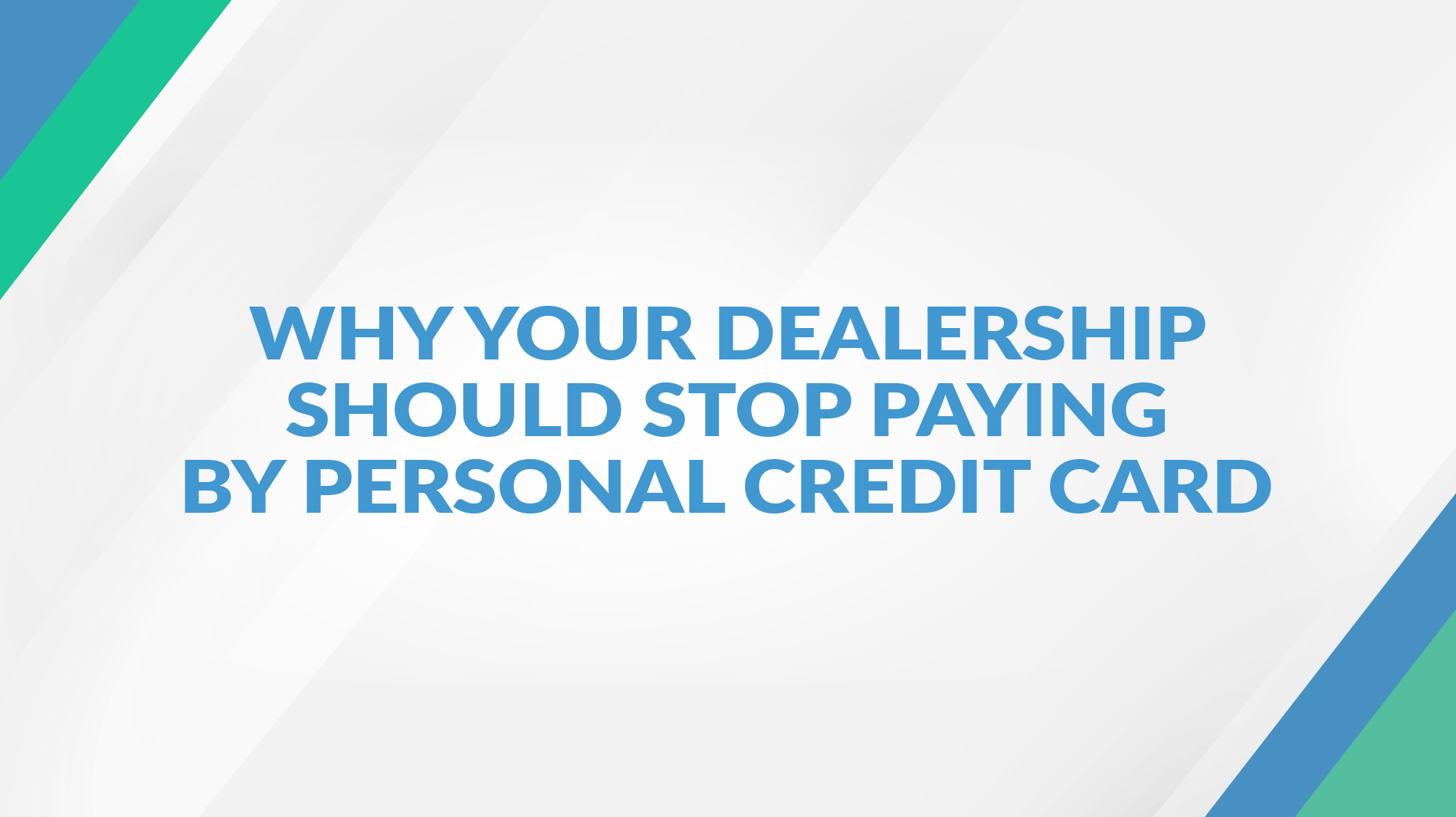Automated Accounts Receivable Programs: Cutting DSO by 30% in Six Months
In today’s economy, speed to cash is as important as speed to market. Companies that let receivables linger for 60, 75, or even 90 days are putting...

Personal credit cards are still a popular way for businesses to cover expenses, whether it’s for products, office supplies, repair services or lunches. After all, credit cards are convenient, easy to use, and they’re accepted almost anywhere.
But just because credit cards are versatile as far as transacting goes doesn’t mean they’re the best payment solution for your automotive dealership’s AP department. When you really dig into the subject, you might just find that your dealership’s payment processing strategies are pretty much stuck in neutral.
Want to know what’s stopping them from getting in gear and why your dealership should stop paying by personal credit cards?
Keep reading to learn more …
Did you know that in 2020 alone, US credit card fraud totaled over $11 billion?
If you’ve got your accounts payable staff using credit cards to pay vendors online or by phone, there are going to be a number of risks involved. For one, there’s a risk that the credit card itself could be misused by someone in the office, whether it’s the employee responsible for paying or not. While this isn’t a risk we like to think about, the reality is present and it needs to be considered.
The bigger risk involved in using credit cards is the potential for card information to get stolen or misused by a third party. An AP staff member paying a vendor online could be directed to a spoof website and then fall victim to a phishing scam in which they turn over credit card information unknowingly. Additionally, vendors could be storing credit card information in an unsafe online environment and then inadvertently expose it to hackers during a security breach. In a worst-case scenario—someone at the vendor’s company uses your card to commit fraud themselves.
How many invoices does your AP staff process each month?
Paying vendors manually using a personal credit card takes a significant amount of time. It starts with repetitive data entry of an individual’s card information including name, account number, expiration date, and CVV. On top of that, there’s no way to assign the card to particular vendors or assign rules for the credit card’s use.
Here’s another problem: Using a personal credit card requires accounts payable to create an expense account for the card against the general ledger, and each payment needs to be manually recorded against the expense account so that it balances. There’s no way to assign single charge codes to a vendor, nor is there a way to extract the information automatically and analyze spending per vendor. This results in time and money wasted managing expense records, plus it opens up the possibility of incorrectly paying invoices.
Did you know you can get 1% cashback every time you use a virtual card?
When your AP department uses a personal credit card to pay vendors, there might be rewards points available as a bonus for using the card, but there’s no way to gather 1% cashback on your spend because the points-to-dollar ratio is never 1:1 with traditional credit cards.
Not sure what cash rebates are, exactly?
A cash rebate is a kickback you get from the third-party payment company that administers your virtual card. Because virtual card transactions generate revenue for the third-party payment company, the kickback you receive is simply a percentage of the payment company’s revenue. Some companies tier their rebates based on your spend volume and some offer a flat percentage back to you when you pay with your virtual card.
Why use personal credit cards to pay vendors when virtual cards get rid of those pesky manual processes?
These features could be worth switching payment methods:
Faster Payment: Virtual card payments are settled in real time, so not only does your vendor get paid immediately, but your spend syncs right back to your accounting system—allowing you to perform real-time analytics.
More security: A virtual card doesn’t have the same risk as a personal credit card because the account numbers generated are always unique and are not tied to any hard data. In other words, no one can gain access to your bank accounts when you use a virtual card. You can also set payment limits for the amount of purchase, vendor name, and payment date range when you utilize a virtual card.
Easy to Use: Any vendor who takes personal credit card payments can accept virtual cards too. And virtual cards work just like personal credit cards, but the bonus is that if you make recurring payments to vendors with them, you can store virtual card information and alleviate the need to manually re-enter numbers every time you pay.
Auto dealerships have used credit cards to pay invoices for years. And the points associated with them can be a good way to gain value from payment transactions. However, these cards often come with rewards caps based on the card’s credit limit or some predetermined, arbitrary number. The points you can earn often have an average value of $0.05 to $0.01 each per dollar spent too.
When you use virtual cards to pay vendors, you can get 1% cash rebates per dollar spent, on average. And what’s great about using virtual cards in your industry is that auto dealerships tend to gather a significant amount of rebate return because many vendors are B2C-facing and already accept virtual card payments.
Let’s look at some numbers:
|
Earnings per Month |
Earnings per Year |
|
|
Credit Card Rewards
|
$0.005 x $250,000= $1,250 earned per month |
$0.005 x $250,000 x 12 months= $15,000 earned per year |
|
Virtual Card Cash Rebates
|
$0.01 x $250,000= $2,500 earned per month |
$0.01 x $250,000 x 12 months= $30,000 earned per year |
A good payment automation solution for your dealership not only speeds up invoice processing, but it also helps you pay vendors faster and settle accounts easier.
APSmart is an end-to-end automated accounts payable software configured for the unique workflows of your automotive business. With APSmart, you get complete visibility of your invoice and payment processes in addition to unique reconciliation features, audit tools, and fraud protection.
With full P2P automation capacity, you can digitize 100% of your invoices, control and change who makes approvals, set up workflows to streamline your payments, automate approvals, and much more. APSmart also automatically indexes and catalogs your documents so you can recall them whenever they need to be referenced.
An excellent add-on worth its weight is APSmart’s PAYSmart module. This payables solution combines your payments into a single file, centralizes payment execution, and gathers you monthly cash rebates on eligible purchases. PAYSmart can run a batch of virtual card payments, ACH transactions, and check transactions from a single payment function, otherwise known as “integrated payables.”
While paying invoices with a personal credit card might seem logical, virtual cards can put your auto dealership’s AP department into a brand new level of functionality and efficiency when combined with the right AP automation solution.
CloudX is fast-tracking auto dealerships across the US by streamlining their AP processes and assisting them in gathering valuable cash rebates on their spend. Want to see what CloudX can do for your dealership?

In today’s economy, speed to cash is as important as speed to market. Companies that let receivables linger for 60, 75, or even 90 days are putting...

Managing operational costs today often means balancing operational costs against tight margins, making it essential to join a group purchasing...